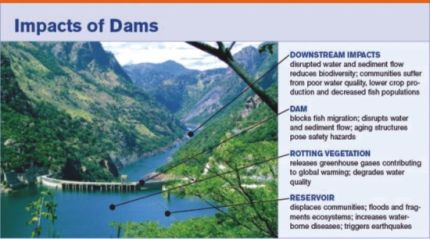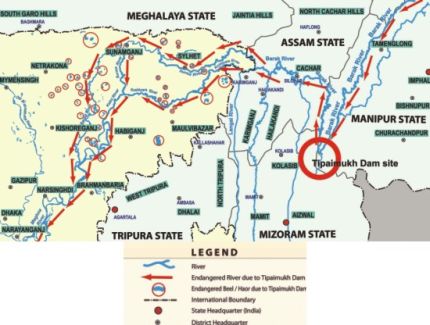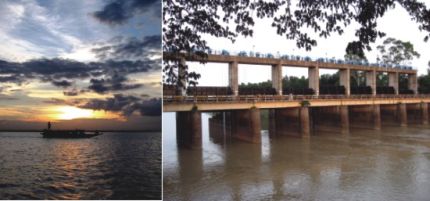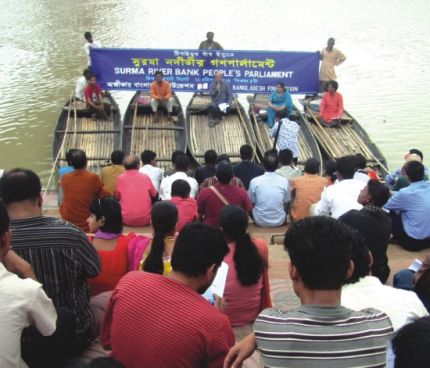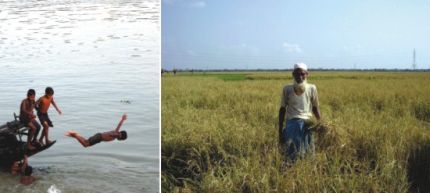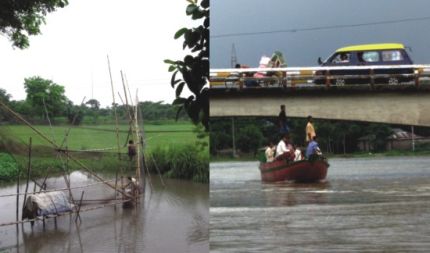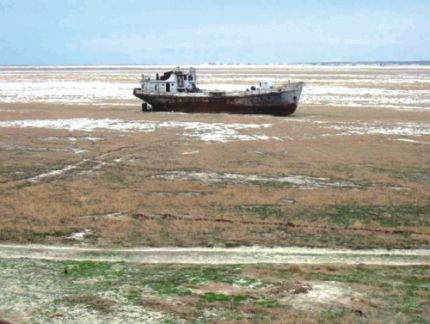TODAY -
Muddying the Waters
- Part 2 -
By Syed Zain Al-Mahmood *
India's plan to build a mega dam on the Barak river at Tipaimukh has stirred primal fears in Bangladesh. For the 150 million people of this low-lying delta, the rivers are the cradle of life. Bangladeshis depend on the river system for food, water and transportation. After the disaster caused by India's Farakka Barrage, Bangladesh can ill afford another monstrosity that will squeeze the rivers' life-giving flow. Public concern has been heightened by the extraordinary secrecy that has shrouded Tipaimukh from the beginning. Although Indian diplomats have been at pains to assure Bangladesh that Tipaimukh will not have the same ecological effects as Farakka, people remain fearful. Many critics have suggested the Tipaimukh Multipurpose Dam project could cause desertification of the North-east and allow salinity to move up from the Bay of Bengal. But the freewheeling debate about desertification may be masking more critical social and environmental consequences.
|
The haors or flood plains of the Surma basin are unique ecosystems home to a rich variety of flora and fauna. Parts of the region have been designated Ramsar sites of international importance, and protected by the Bangladesh government as Ecologically Critical Areas (ECA). The total area of this wetland covers nearly 25000 square kilometers and supports approximately 20 million people.
The wetlands of the Surma basin perform two crucial functions: they serve as the granaries and fisheries of the Northeast. Many of the species inhabiting the haors will be threatened by loss of habitat, but more importantly it is the people of the wetlands who might be on the endangered list if the Tipaimukh dam goes ahead.
Rustam Ali, 71, is a farmer in the Northeastern district of Sunamgonj. His weather-beaten face tells the bittersweet story of rice production. "Because of the water, we can grow only a single crop the Boro. We plant when the water recedes in the winter, and harvest before the monsoon waters come. Because of the silt deposited by the floods, God willing, we always have a bumper crop."
The hilly parts of the Northeast are not fertile, and therefore the rice mills of Ashugonj, Bhairab and elsewhere are heavily dependent on rice from the lowlands. The farmers and rice traders bring the rice on wooden longboats, navigating skilfully across the floodplain.
|
The rivers are woven tightly into the lives of the haor people. They literally live by the ebb and flow of the waters. Any artificial alteration of the "flood pulse" could affect food security and bring disaster to the region.
"If the water increased in the Surma and Kushiara during the dry season, the haor would be waterlogged. We would not be able to plant," says Rustam Ali "there would be no harvest."
The fishing community would also be badly hit. "When the water rises in the river during the monsoon, the fish go into the haors to spawn," says Raquibul Amin, Programme Coordinator for the World Conservation Union (IUCN) Bangladesh. The flood not only carries fish larvae but much-needed nutrients into the haor which turns into a vast nursery for fish. When the water recedes in the winter, the fattened fish move out into the rivers and are caught in the nets of the fishing villages lining the riverbanks. If the wetlands were waterlogged, the seasonal rhythm of the fish would be seriously hampered.
Studies of large hydroelectric dams worldwide have shown the artificial flattening of the "flood pulse" adversely affects lower riparian fishing and agricultural communities. A study carried out by the Helsinki University of Technology on the Mekong River found that hydroelectric dams in China drastically reduced the load of fertile sediment carried by the monsoon floods, affecting the fertility of the Mekong's fisheries in Thailand, Laos and Cambodia.
|
Some experts suggest that the Tipaimukh dam may help control flash floods, but others have warned of worse flooding to come. "The dam and the reservoir have certain limitations," says Dr Jahir Bin Alam, head of the Department of Civil and Environmental Engineering at Shahjalal University of Science & Technology. "The dam may control some of the annual flooding. But when there is a really big rise in water levels, the gates will have to be opened to save the dam itself. That will lead to a much bigger flood downstream."
There are other aspects of large hydroelectric dams that are well documented but much less well known. The major hydrological impact of such dams is to impose on the river an unnatural pattern of flow variations. As the environmentalist Wallace Stegner puts it, "a dammed river is not only stoppered like a bathtub, but it is turned on and off like a tap."
The Mekong River Commission has held hydroelectric dams responsible for bizarre fluctuations in the river flow in recent seasons. As the turbines are switched on and off to meet changes in electricity demand, their reservoirs empty and fill -- and the river downstream sees fluctuations in water levels of up to a metre a day.
In 2000, the World Commission on Dams found that the "changed hydrological regime of rivers has adversely affected floodplain agriculture, fisheries, pasture and forests that constituted the organising element of community livelihood and culture."
A dam holds back sediments and nutrients that would naturally replenish downstream ecosystems. Deprived of its sediment load, the "hungry" river seeks to recapture it by eroding the downstream river bed and banks, undermining bridges and other riverbank structures. Riverbeds downstream of dams are typically eroded by several meters within the first decade of commissioning of the dam. International hydrologists say the damage can extend for hundreds of kilometres below a dam.
Even more alarming is the finding that riverbed deepening will also lower groundwater tables along the course of a river, threatening vegetation and local wells in the floodplain and requiring crop irrigation in places where there was previously no need. With ground water tables already seriously low in Bangladesh, further lowering would precipitate a crisis in urban areas hugging the rivers, such as Sylhet, Maulvibazar and Habigonj.
|
The Indian High Commissioner Pinak Ranjan Chakravarty has rubbished claims that the Dam would be harmful for Bangladesh. He dismissed worries that the reservoir may cause seismic disturbance in quake-prone Manipur, saying, "There is absolutely no evidence that dams cause earthquakes." But the High Commissioner may be on shaky ground.
Worldwide, there is a growing body of evidence that shows earthquakes can be induced by very large hydropower dams. The most serious case may be the Richter 7.9 magnitude Sichuan earthquake in May 2008, which killed an estimated 80,000 people and has been linked to the construction of the Zipingpu Dam. In a paper prepared for the World Commission on Dams, Indian scientist Dr. V. P Jauhari described this phenomenon, known as Reservoir-Induced Seismicity (RIS). "There is a positive correlation between the height of the water column in the reservoirs and the seismicity induced," wrote Dr. Jauhari.
|
Dr Soibam Ibotombi of the Department of Earth Sciences, Manipur University warns: "The likelihood that during 1991-2015 the (Tipaimukh) region would experience an earthquake of magnitude 7.6 is between 40 and 60 per cent." Based on a dam-break study conducted as part of Bangladesh's Flood Action Plan 6 (FAP-6), international hydraulic and environmental experts concluded that in the event of a dam failure at Tipaimukh, a wall of water more than 15 feet high would reach Sylhet within 24 hours.
Faced with a public outcry, the government of Bangladesh has adopted a wait-and-see approach, with several ministers citing Indian claims that the dam would not harm Bangladesh. Mir Sazzad Hossain, member of the Joint River Commission told the Star that although India would have sole control over the river flow, the Indians had "assured" Bangladesh that they would not build a barrage on the river, or divert any water. But the low-key approach has been criticised by environmentalists who think the government should do its homework and come out strongly against the dam.
"If you put a 50-storey building right in the middle of a living river, no matter how many windows there are do you want to tell me there will be no damage to the ecosystem?" asks Engineer Hilaluddin of Angikar.
Many experts have also been critical of the decision to send a parliamentary delegation to visit the site. "The dam has not been built, so there is nothing to see but the hills, the river and the sky," says Ramananda Wangkheirakpam, an environmentalist in Manipur. "The Indian government needs to show it is not breaking international conventions in order to attract foreign investors. We are afraid this visit will legitimise the Dam."
The Guidelines issued in 2000 by the World Commission on Dams clearly state that a dam should not be constructed on a shared river if other riparian States raise an objection that is upheld by an independent panel.
|
Neither Bangladesh nor India has signed the 1997 UN Convention on International Watercourses, but Dr Asif Nazrul, Professor of Law, Dhaka University feels it is still the basis for international edict on shared rivers. "The 1997 Watercourse Agreement requires every state to refrain from undertaking any unilateral project on a transboundary river," says Dr Nazrul. "The Ganges water treaty between India and Bangladesh also says the same thing, and India's actions are contravening that. Both India and Bangladesh should reach a solution respecting the letter and spirit of international law."
Prof Jahir Uddin of Buet suggests a basin-based approach by "bringing all the Riparian countries sharing the river to the table. We must ask the Indians for full disclosure and all relevant information should be made available to experts in Bangladesh. If we can protect the common river's natural wealth that will promote regional peace and prosperity."
Worldwide, the dam debate is rooted in the wider, ongoing debate on equitable and sustainable development. The World Commission on Dams declared in its final report that while "dams have made an important and significant contribution to human development, in too many cases an unacceptable and often unnecessary price has been paid to secure those benefits, especially in social and environmental terms, by people displaced, by communities downstream, by taxpayers and by the natural environment."
|
Concluded....
* This article is published by Syed Zain Al-Mahmood for The Star Magazine which is based in Dhaka, bangladesh. The writer can be contacted at thestarmagazine(at)gmail(dot)com
You can read the entire article at The Star Magazine . This article was webcasted on August 18th, 2009.
* Comments posted by users in this discussion thread and other parts of this site are opinions of the individuals posting them (whose user ID is displayed alongside) and not the views of e-pao.net. We strongly recommend that users exercise responsibility, sensitivity and caution over language while writing your opinions which will be seen and read by other users. Please read a complete Guideline on using comments on this website.
LATEST IN E-PAO.NET
Jump Start
DBS Imphal SubSite |
Readers Mail |
Editorials |
Education Announcements |
Essay |
Exclusive Event |
Flash - Audio Visual |
Incidents |
LFS Imphal SubSite |
News Timeline |
Poetry |
Opinion |
Sports |
Rock Concert |
RSS |
Top Stories |
Wathi Jugai





